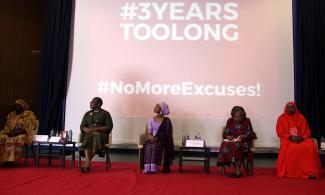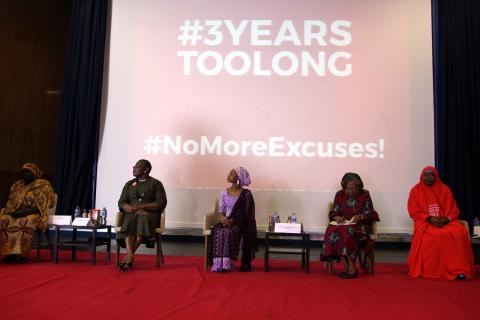
Nigeria held rallies in major cities Thursday to mark three years since the mass abduction of 276 schoolgirls by Boko Haram extremists.
Spearheading the rallies was the Bring Back Our Girls movement, which has been urging the government of President Muhammadu Buhari to ramp up efforts to free the 195 girls still believed held by the radical Islamic group.
Nigeria held rallies in major cities Thursday to mark three years since the mass abduction of 276 schoolgirls by Boko Haram extremists.
Spearheading the rallies was the Bring Back Our Girls movement, which has been urging the government of President Muhammadu Buhari to ramp up efforts to free the 195 girls still believed held by the radical Islamic group.
One rally was being held in the capital Abuja, where Nigeria’s second most influential traditional Muslim leader, the Emir of Kano, was to make an address and lead prayers.
Parents of the missing were congregating at the school where their daughters aged 12 to 17 were kidnapped in the northeastern village of Chibok on April 14, 2014.
Participants were set to plant trees as a symbolic gesture in memory of the missing girls.
Another rally was due in the country’s commercial center Lagos.
Fifty-seven girls escaped in the immediate aftermath of the kidnapping while three others were found or rescued by the military. Some had babies in captivity.
Last October, 21 were freed after negotiations between Boko Haram and the Nigerian government brokered by the ICRC and the Swiss government.
The Chibok schoolgirls have become a symbol of the Boko Haram insurgency that began in 2009 and has left at least 20,000 people dead.
Despite a military fight-back, villages near Chibok, which is 125 kilometers (80 miles) by road from the Borno state capital, Maiduguri, have seen a wave of suspected Boko Haram attacks in recent months.
A presidential spokesman said Wednesday negotiations were ongoing with “foreign entities” for the release of those still held by the fundamentalist group active in Nigeria’s northeast and which has pledged allegiance to Islamic State.
Having started as an extremist sect Boko Haram has mushroomed in recent years into an ultra-violent jihadist movement which uses mass kidnapping as a recruitment tool.
In December, Buhari triumphantly announced the “final crushing” of the group, which he described as being “on the run” after an army offensive flushed them out of their stronghold in the huge Sambisa forest.
Boko Haram leader Abubakar Shekau denied the claim and said that some of the abducted girls were killed in Nigerian air strikes against his group.
Support from abroad came in the shape of a British government statement Friday.
“We are working side by side with Nigeria in the fight against Boko Haram and call for the release of all those who have been taken,” a foreign ministry statement read.
